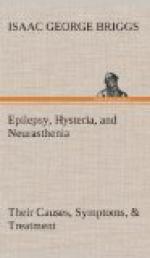These children have no balance, and are usually selfish, always garrulous, with a love of romancing, while a ready wit combined with fertile imagination often gains them a bubble reputation for learning they do not possess. Invention, poetry, music, artistic taste and originality are occasionally of a high order, and the memory is sometimes phenomenal; but desultory, half-finished work, and shiftlessness are the rule.
Their appetite is fitful and fanciful, they like unsuitable foods, and their digestive system is easily upset. At puberty, sexual perversity is common, and the animal appetite, is as a rule, very strong, though rarely, it may be absent. During adolescence, there is excessive shyness or bravado, always introspection, and exaggerated self-consciousness.
As they grow older, they readily contract hypochondria, neurasthenia, hysteria, alcoholism, insomnia and drug habits, and react unduly to the most trifling external causes, even to the weather, by which they are exhilarated or depressed.
Education. Send them to school only when the law compels you, and observe them closely while there, for health is far more important to them than education. “Infant prodigies” lack the mental staying power and physical robustness which real success demands, though they may do well for a time. Go to your old school: the successes of to-day were dunces twenty years ago; about those whose names are proudly emblazoned in fading gold on Rolls of Honour, a discreet silence is maintained.
Keep a keen lookout for symptoms of over-effort. Sleepiness, languor, a vacant expression, forehead wrinkled, eyebrows knit, eyes dull, sunken and surrounded by dark rings, twitchings, restlessness, or loss of appetite are all warnings that the pace is too strong for the child.
“These are the cases
in which the School Board—who ordain that
if
children are well enough to
play or run errands, they are well enough
to attend school—should
be defied.”
This defiance must of course be reinforced by a doctor’s certificate.
To the healthy, the strain of preparing for and enduring an examination is tremendous; to highly strung children it is dangerous. Home-work should be forbidden in spite of the authorities. Let the child join in the sports of the school as much as possible.
School misdemeanours form a thorny problem, for discipline must be maintained, and a stern but just discipline is very wholesome for this type, who are too apt to assume that because they are abnormal, they can be idle and refractory. On the other hand, parents should promptly and vigorously object to their children being punished for errors in lessons, or struck on the head.
Diet. Food, while being nourishing, and easily digested, must not be stimulating or “pappy”. Meat, condiments, tea, coffee and alcohol are highly undesirable, a child’s beverage being milk and water.




